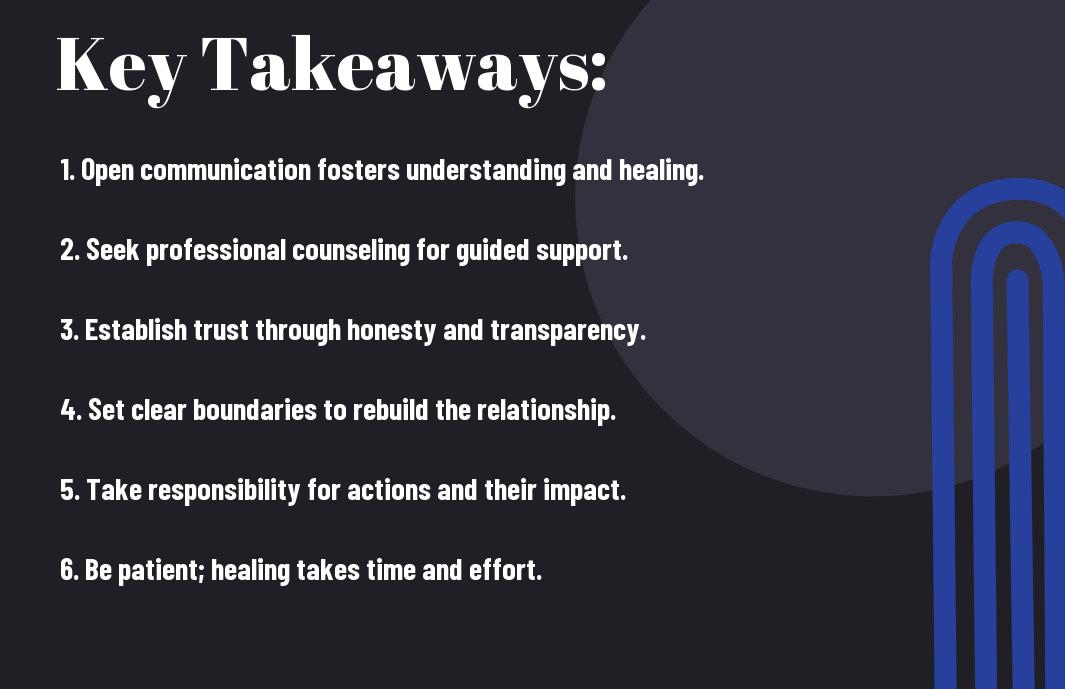Just facing infidelity can feel overwhelming and devastating, but you have the power to rebuild and restore your relationship. Understanding the important steps and available services can guide you through this challenging process, allowing you to navigate complex emotions and facilitate healthy communication. Whether you are seeking professional help or exploring self-help strategies, this guide aims to empower you with the tools you need to turn betrayal into a path of healing for you and your partner.
Key Takeaways:
- Open communication is vital for both partners to express feelings and concerns related to the infidelity.
- Establishing trust takes time; patience is necessary as both partners navigate this emotional journey.
- Consider seeking professional counseling to facilitate discussions and provide expert guidance.
- Set clear boundaries to rebuild trust and ensure both partners feel secure moving forward.
- Work on individual healing, as personal growth can enhance the relationship’s overall health.
- Explore support groups or resources for individuals affected by infidelity to connect with others who share similar experiences.
- Focus on ways to strengthen the relationship overall, including shared activities or goal-setting together.

Understanding Infidelity
While infidelity can take many forms, it fundamentally represents a breach of trust in a relationship. It often leaves partners grappling with complex emotions, causing significant pain and confusion. Recognizing the factors that contribute to infidelity can aid in the reconciliation process and help you understand your relationship better.
Types of Infidelity
Infidelity is not one-size-fits-all; different circumstances shape the nature of the betrayal. Understanding these types can provide clarity on your situation. Here are some common forms:
- Emotional infidelity – forming a deep emotional connection outside the relationship.
- Physical infidelity – engaging in sexual relations with someone other than your partner.
- Online infidelity – connecting romantically or sexually through digital means.
- Micro-cheating – subtle actions that violate the spirit of your relationship.
- Serial infidelity – repeatedly cheating over time, often within multiple relationships.
Any of these forms presents challenges that you may face as you navigate the path to healing.
| Type of Infidelity | Description |
| Emotional infidelity | Deep, emotional bonds outside your primary relationship. |
| Physical infidelity | Consensual sexual activities with others. |
| Online infidelity | Engaging with others in a romantic or sexual manner online. |
| Micro-cheating | Minor actions that may disregard relationship boundaries. |
| Serial infidelity | Patterns of infidelity across multiple relationships. |
Emotional and Psychological Impact
Types of infidelity can lead to a range of emotional and psychological effects that you may experience. These feelings often include intense sadness, betrayal, diminished self-esteem, and confusion about your relationship’s future. The impact often spreads, affecting not only your emotional state but also how you interact with others.
Understanding the emotional and psychological impact of infidelity is necessary for your healing journey. You may face feelings of shame, anxiety, or even anger as you come to terms with the situation. Establishing open communication with your partner about these feelings can foster a deeper understanding. Consider seeking support from counselors or therapists, as they can help you navigate these complex emotions, transforming this experience into an opportunity for growth and healing.
The Importance of Reconciliation
It is important to understand that reconciliation after infidelity serves as the foundation for healing and rebuilding your relationship. It allows both partners to address the emotional turmoil, regain lost intimacy, and foster a deeper emotional connection. Engaging in reconciliation provides an opportunity to learn from past mistakes and reinforces the commitment to each other, ultimately leading to a healthier and stronger relationship moving forward.
Assessing the Relationship
At this stage, take a step back to evaluate the dynamics of your relationship. Recognize the factors that contributed to the infidelity and identify both the strengths and weaknesses that exist between you and your partner. Honest communication about feelings, needs, and expectations will help you gain clarity on whether to pursue reconciliation or reconsider your path moving forward.
Benefits of Rebuilding Trust
Along your journey toward reconciliation, rebuilding trust can transform your relationship into a more resilient partnership. Trust acts as the foundation for emotional safety, fostering a sense of stability and security that enables both partners to thrive. As trust is restored, you will experience increased openness and vulnerability, paving the way for improved communication and intimacy.
Relationship growth takes time and effort, yet it is possible to transform your bond into something even stronger than before. Building trust requires transparency, consistent actions, and open dialogue, which will ultimately create a deeper emotional connection. This process not only allows you to heal past wounds but also empowers your relationship by establishing a mutual understanding of boundaries, expectations, and commitments. Engaging fully in this rebuilding process can lead to a thriving, meaningful partnership that is less vulnerable to future challenges.
Steps to Reconciliation
Keep in mind that reconciliation takes time and effort from both partners. You’re commenceing on a journey that requires a commitment to honesty, vulnerability, and mutual respect. By following these steps, you can steadily rebuild trust and strengthen your relationship, allowing you both to heal and grow together.
Honest Communication
After infidelity, it’s important to have open dialogues about your feelings, expectations, and fears. This means addressing the issues directly and honestly, even if it feels uncomfortable. Only through this transparent exchange can you hope to rebuild trust and deepen your emotional connection.
Setting Boundaries
Below the surface of reconciliation, establishing boundaries is important. Ensure that you and your partner agree on what is acceptable moving forward, maintaining a safe space for both of you to communicate and grow without repeating past mistakes.
For instance, you might agree to limit interaction with individuals who could pose a risk to your relationship or establish rules regarding social media. It’s about creating a framework where both of you feel secure and respected. Your boundaries can evolve over time, so it’s important to check in with each other regularly and adjust them as needed to foster trust and understanding.
Seeking Professional Help
One of the most effective steps you can take is to enlist the help of a qualified therapist. Professional guidance provides a neutral space where you can discuss your feelings and experiences without judgment, allowing you both to focus on healing.
Seeking professional help can help you both navigate the complex emotions surrounding infidelity. Therapists can offer specialized strategies to help you address underlying issues in your relationship, improve communication skills, and foster empathy. Engaging in couples therapy can be a transformative step toward a healthier and more resilient partnership.

Therapy and Counseling Options
After experiencing infidelity, seeking therapy and counseling options can be imperative for healing and rebuilding trust. Professionals can offer invaluable support, guiding you through the emotional fallout and fostering effective communication between partners. These services not only provide coping strategies but also help you understand the root causes of infidelity, paving the way towards reconciliation.
Individual Therapy
By engaging in individual therapy, you can work through your feelings of betrayal, anger, and confusion in a safe, non-judgmental environment. This personal space allows for deep self-reflection and a better understanding of your emotions and motivations, enabling you to take steps toward healing and personal growth.
Couples Counseling
Among the most effective methods for couples facing infidelity is couples counseling, where both partners can explore the underlying issues together. This shared experience not only facilitates open dialogue but also promotes mutual understanding, allowing you to identify patterns and behaviors that may have contributed to the breach of trust.
Further, couples counseling provides structured support as you confront the aftermath of infidelity. In these sessions, you and your partner can work on effective communication skills and rebuild emotional intimacy. It’s a safe place to express your feelings and address underlying issues that may have led to the infidelity. Couples counseling can be a turning point, offering tools to navigate the complex emotions involved and guide you both toward a hopeful future together, whether that future is renewed love or amicable separation.
Tools and Resources for Healing
Despite the emotional turmoil that follows infidelity, various tools and resources can facilitate your healing journey. Engaging with these resources not only helps you understand your emotions but also empowers you to rebuild trust and communication in your relationship. From literature that offers insights to support groups providing community understanding, each tool can guide you towards a more resilient partnership.
Books and Literature
By entering into recommended books on infidelity, relationships, and healing, you can gain valuable perspectives that may resonate with your experiences. Literature often provides stories of resilience and practical strategies, allowing you to better comprehend your feelings and potentially offering pathways to restore your relationship with greater understanding.
Support Groups and Workshops
Resources like support groups and workshops provide a safe space for you to share your feelings and experiences. Engaging with others who have faced similar challenges can foster a sense of community and understanding.
Also, participating in workshops can equip you with effective communication techniques and coping strategies. These settings offer an opportunity to explore into shared experiences, allowing you to feel less isolated in your journey. With trained facilitators guiding discussions, you can discover valuable insights that might help you navigate your path toward recovery and reconnection. This communal approach not only provides practical tips but also fosters emotional support that is vital during this healing process.

Moving Forward Together
Many couples face significant challenges after infidelity, but moving forward together is possible with commitment and openness. Start by seeking Advice on first steps to reconcile with my husband after … to guide your journey toward healing and rebuilding trust.
Establishing New Norms
At this stage, it’s important to create new standards for your relationship. Discuss what you both need to feel secure and develop new habits that encourage emotional closeness. This may include regular check-ins, quality time together, and setting clear boundaries to foster a safe environment.
Maintaining Transparency
By prioritizing communication and openness, you can foster a trusting atmosphere. It’s necessary to share thoughts and feelings honestly while encouraging your partner to do the same. This mutual vulnerability strengthens your bond and diminishes feelings of resentment.
Considering the aftermath of infidelity, maintaining transparency is foundational for rebuilding trust. Regularly check in with each other about your emotions and experiences—this can prevent misunderstandings. Ensure you share your daily lives in detail, from who you’re with to how you feel. Establish a no-secrets policy, where even minor issues are addressed promptly. This openness helps eliminate any lingering mistrust and allows for a healthier dynamic as you both recover from this challenging chapter.
Final Words
Summing up, navigating reconciliation after infidelity requires a structured approach and dedicated effort from both partners. Begin by openly communicating your feelings and establishing trust through transparency. Seeking the help of a professional counselor can provide you with valuable tools and insights to heal and grow together. Engage in regular check-ins to monitor progress and foster a supportive environment. By following these steps, you can work towards rebuilding your relationship and emerging stronger together, ultimately transforming a painful experience into an opportunity for deeper connection.
FAQ
Q: What are the first steps to take after discovering infidelity?
A: The initial steps involve both partners communicating openly about feelings. This means recognizing the emotional pain and confusion that comes with infidelity. It’s important to allow each person to share their perspective without judgment. Seeking the assistance of a professional therapist can help facilitate this dialogue. Setting a time to process emotions and making a commitment to work through the situation is vital.
Q: How can couples rebuild trust after infidelity?
A: Rebuilding trust requires transparency and accountability from the partner who was unfaithful. This might include sharing their whereabouts, being open about their communication, and actively working on regaining the other partner’s confidence. Both partners should engage in discussions about their feelings and needs, and establish new boundaries that promote safety and security in the relationship.
Q: What role does counseling play in the reconciliation process?
A: Counseling can provide a safe and structured environment for couples to address the emotional fallout of infidelity. A trained therapist can guide discussions, helping both partners articulate their feelings, navigate their pain, and determine what they need from each other moving forward. Therapy can also equip couples with tools to strengthen their connection and prevent future issues.
Q: How long does the reconciliation process typically take?
A: The duration of the reconciliation process varies for each couple. It largely depends on individual circumstances, including the depth of the emotional wounds, the commitment to change, and the effectiveness of communication strategies employed. It’s important to acknowledge that healing isn’t linear; some days may feel more challenging than others. Patience and consistent efforts are crucial components throughout this journey.
Q: Are there specific services available to assist in this process?
A: Yes, there are various services designed to support couples facing infidelity challenges. These include couples counseling, support groups, workshops focused on healing and rebuilding trust, and online resources dedicated to relationship recovery. Exploring options that align with your needs and comfort levels can facilitate a more guided and effective reconciliation process.
